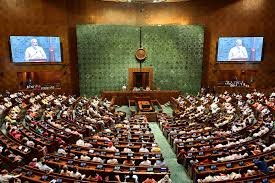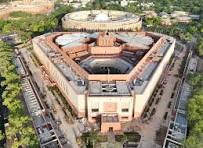New Delhi: India’s “One Nation, One Election” initiative advanced significantly with the introduction of two key bills in the Lok Sabha on December 17. Union Law Minister Arjun Ram Meghwal tabled the Constitution (129th Amendment) Bill and the Union Territories Amendment Bill, both designed to synchronize elections across the country, including those in Union Territories, with Lok Sabha polls.
A 90-minute heated debate preceded the introduction of the Constitution (129th Amendment) Bill. The voting results saw 269 members supporting the bill and 198 opposing it. Alongside this, the Union Territories Amendment Bill was also presented to facilitate synchronized electoral timelines in regions like Delhi, Jammu & Kashmir, and Puducherry.

Both bills will now undergo a detailed review by a Joint Parliamentary Committee (JPC). Speaker Om Birla is expected to announce the JPC’s composition soon, which will likely include 31 members—21 from the Lok Sabha and 10 from the Rajya Sabha. Sources indicate a BJP MP will chair the committee, reflecting the party’s majority representation.
The JPC will consult a wide range of stakeholders, including political parties, former judges, election commissioners, state assembly speakers, and citizens. This phase will ensure diverse perspectives are considered in shaping the bills.
Following consultations, the JPC will perform a detailed clause-by-clause examination and finalize its recommendations. The committee’s findings will be submitted to the Lok Sabha Speaker, who will set a timeline for its report. Experts estimate the process could take at least six months.
The “One Nation, One Election” proposal has faced strong opposition from parties like Congress, the Samajwadi Party (SP), and Shiv Sena (UBT), who argue it undermines the Constitution, federalism, and democratic principles. Opposition leaders criticized it as an attempt to centralize power, describing it as “unconstitutional” and a threat to India’s federal structure.
The Constitution (129th Amendment) Bill proposes five key amendments, requiring a two-thirds majority in Parliament for passage. Achieving this level of consensus will be critical for the success of the “One Nation, One Election” framework.
The introduction of these bills is a notable step toward the goal of synchronized elections in India. With the JPC leading stakeholder engagement and scrutiny, the next few months will be crucial in determining the future of this ambitious electoral reform.



